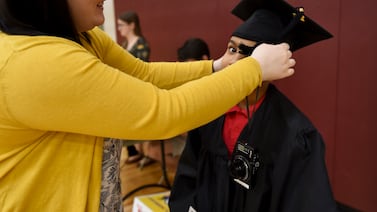Laura Byes has had her hands full trying to keep the coronavirus from disrupting her child care center over the last school year – from ensuring that she had enough staff to fill vacancies to closing classrooms when students were diagnosed with COVID-19. This year, she’ll also be working to persuade parents to vaccinate their children.
“If one child in the classroom tests positive,” said Byes, “the whole classroom shuts down, which affects up to 15 children per classroom.”
Byes is the executive director of Learning Bridge Early Education Center, a child care center in Evanston, Illinois that serves low-income families of children under 5. With the rollout of COVID vaccines for children in that age group, Byes hopes the center can return to some level of normalcy.
The last couple of years have been hard for Illinois child care providers, who have gotten little reprieve from COVID-19. While vaccines for young children may bring some relief to child care providers and parents, they may not get the same uptake as the adult vaccines.
Since COVID vaccines were approved for children under 5 in June, about 5.6% of Illinois children have gotten their first dose. Data from the Illinois Department of Public Health, which lags a few days, indicates 39,000 out of 700,000 children between 6 months and 4 years old have gotten shots.
In Chicago, 12,474 of the more than 162,000 children under 5 – about 7.7% – have received their first dose of a COVID vaccine as of Tuesday, according to data posted by the Chicago Department of Public Health
The vaccination rates for children ages 5 to 11 have stagnated since the initial wave of enthusiasm last fall. Statewide, only 38.6% of children in that age group are fully vaccinated and 10% are boosted out of a population of more than 1.1 million.
Michael Claffey, a spokesman for the state’s department of public health, says the department has been working with the Illinois Chapter of the American Academy of Pediatrics and local health departments across the state to promote vaccination for all ages.
Parents have a lot more questions about vaccinating their children than they did about vaccinating themselves, says Dr. Kristin Kan, an assistant professor at Lurie Children’s Hospital/Northwestern University School of Medicine.
Educating parents about the vaccine could help get more children vaccinated, Kan says.
“As a primary care pediatrician, I found in my practice that there’s a certain group of parents who have been waiting for this to be approved,” Kan said. “But, there are other parents who want to understand why there’s a lower dose and what (did) they find in the trials as far as safety and efficacy?”
Kan says more work needs to be done to build relationships between medical professionals and communities across the state, not just in a time of crisis. Many low-income families and people of color still lack access to medical care.
The Food and Drug Administration and the Centers for Disease Control and Prevention approved COVID-19 vaccines for children under 5 in mid-June. Moderna’s vaccine for children under 5 requires two doses four weeks apart, while Pfizer’s vaccine requires three doses over the course of 11 weeks.
Needing multiple shots and more than one return visit for vaccinations could be a barrier to children receiving the required dose to be fully vaccinated, said Kan.
However, she doesn’t anticipate that it will be a large problem because it is common practice in early childhood to prevent other infectious diseases such as chickenpox and measles.
Laura Byes, executive director of Learning Bridge Early Education Center in Evanston, is hoping children at her center receive their COVID vaccinations. She wants to see all classrooms operating in the center and for parents — who were not allowed in the center over the past year — to get the chance to meet other parents and children.
Mauricio Peña contributed reporting.
Samantha Smylie is the state education reporter for Chalkbeat Chicago, covering school districts across the state, legislation, special education, and the state board of education. Contact Samantha at ssmylie@chalkbeat.org.

![[From left to right] A woman in a gray shirt and orange mask holds a child in a pink and blue shirt who is receiving a shot. The child is holding a lollipop while a medical professional in blue gloves holds her right arm.](https://www.chalkbeat.org/resizer/v2/BMFXV3UTZ5FDDJCTQDQARB5SKQ.jpg?smart=true&auth=aca6d8b7324cec0482727011eeb73ba29af375202bd9978570ee0b2fa019a535&width=4928&height=3285)




